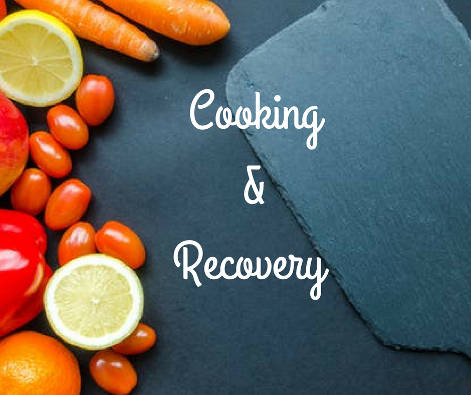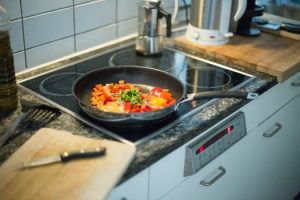

We are meeting with Becca (Nutrition Coordinator and Naturopath), to discuss some questions regarding her experience teaching cooking classes at Bridging the Gaps.
How you are able through the cooking classes, empower clients through nutrition education and demonstrations?
If you think about how you learned or the cooking experiences that have imprinted on your memory. Most of us can remember a time when our mother, father or our grandmother or another someone who we admired made food as we watched them create. Depending on how we learn, we may really always remember that experience and how they made the food. Likely, we will always remember the way the food tasted. It likely tasted better because of the love it contained.
In the classes, we work to create an experience that would be memorable and help the client experience their own ability. Many of my clients have reported that after they simply worked through the action of cooking, they felt more confident and connected themselves with being more experienced. They have associated themselves with now knowing how to do what they tried or practiced. Fear of the unknown often holds a client back from trying something. Just to get through the “trying” helps to achieve some of shift toward empowerment.
The goal of our program is to help the clients be able to support themselves and feel more empowered. For them to also feel capable and confident in their ability to create good and wholesome food for themselves that is affordable and feasible. What I have seen is that as clients are able to practice using the cooking skills they come to own them. Then they find that they are more able to use these skills to support themselves.
Our clients still experience the pull for easy convenience and are always working to strike a balance. It is a challenge just like the rest of us, it takes work to be healthy and slow down cook and savor food. The pull for convenience food is always there.
How have you seen the benefits of hands-on learning in the kitchen affect the clients?
The benefit for our clients is sometimes as simple as keeping them engaged in treatment just for that day. The cooking experience can also help lift their spirits as they engage and become more present in the experience. They have fun in the kitchen and achieve creating delicious food they enjoy.
Returning back to the kitchen in recovery is not always easy, but it surely is rewarding. Learning to have fun in recovery helps make recovery sustainable -it is essential. For some of our clients cooking fits that need.
But it does go further than that, through education and teaching them how to nurture themselves with food, they learn to reorient their thinking about how they fuel their body. Depending on where they start on this journey, it isn’t perfect but it’s a progression toward their best.
Clients have come to me recently saying, “You were the voice in my head when I could have bought snickers,” or “I am ruined now because I am reading labels when I shop.” They learn the food guardrails, or things they should avoid eating, within these boundaries they can create a healthy nutritious foundation. Our clients then get the opportunity to live it out as they progress through the treatment continuum.
I have also seen the benefits of the hands on classes specifically when they start to use it the skills they learn or when their attitudes shift because of the experience. It’s interesting because you don’t know what is going to be that one thing that sticks with someone.
For some it looks like how they changed their breakfast habits and now they eat breakfast. For others it’s knowing and feeling the effects in their body of eating three meals a day and snacks and learning how their mood shifts when they don’t support themselves with good food.
Learning how to cook things they like to eat frees them from having to eat fast food which can be expensive when they are often functioning on a limited income, plus they don’t have the negative health consequences of what fast food will mean for them in short and long term effects.
What is one of the greatest barriers/challenges for clients returning back to the kitchen in recovery that you’ve observed?
One of the greatest barriers is willingness; initially it’s just to engage in the class. Hopefully as they continue to practice cooking they see themselves as more capable and feel more confident.
As a client progresses in their level of care through our continuum, the need for willingness continues to be amazingly important. Clients can often experience a down-turn in their spiritual condition as they gain more freedom.
Part of this is normal, and happens because there is freedom to throw off the routine that has been created for them and has supported them in ways they may not connect with initially. We say it is linked with their spiritual condition because their mood is linked so tightly to the amount of sleep they get or how they are able to eat, and then it influences how they show up, interact, and relate in the world.
Teaching a client to return to healthy practices like cooking at whatever level of willingness can help ease them back into feeling better and more supported. Then that can help them have better days and be more positively engaged in life.
What has been your greatest take away from conducting cooking classes and interacting with the clients around the topic of nutrition?
Oh, the greatest take away is difficult. As I watch clients progress through our facility and through cooking class I see that immense change is possible one step at a time, freedom is possible. But that doesn’t come from just the cooking classes but their whole experience.
However, what I have found also, specifically through the classes is that the simplest things matter. You don’t know what is making a difference for someone, even when it seems like they aren’t connecting or aren’t able to engage well in that particular moment. It’s still important.
I have had clients come through the class having a particularly bad day and see their affect change as they have been able to engage and become more in the moment. Also, I have seen even when a shift in engagement isn’t possible it is still an opportunity to show a client that they matter and what they are doing with food matters.
It’s a message I hope that would continue to be felt and engaged throughout the sessions. It is a message that says: you matter, how you love yourself through food matters, and as a client you are capable of nurturing yourself and loving yourself well, and that will help you be the best version of yourself in life.